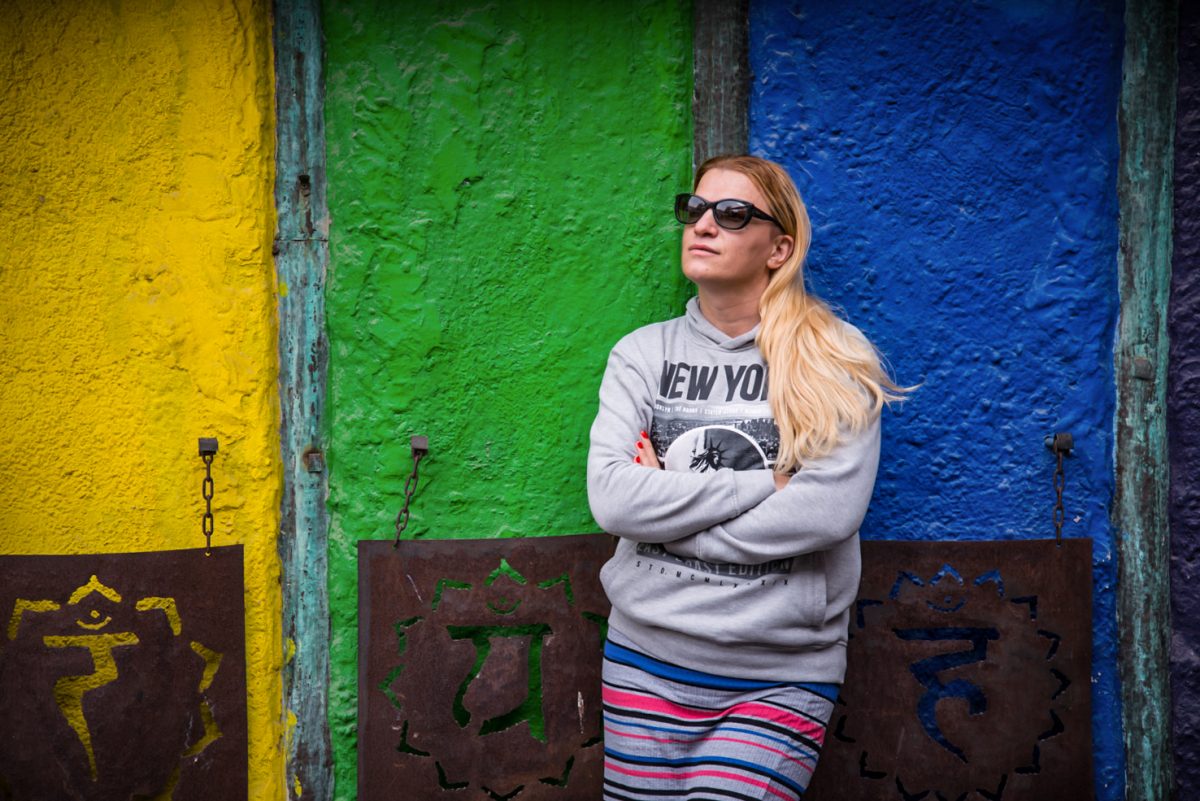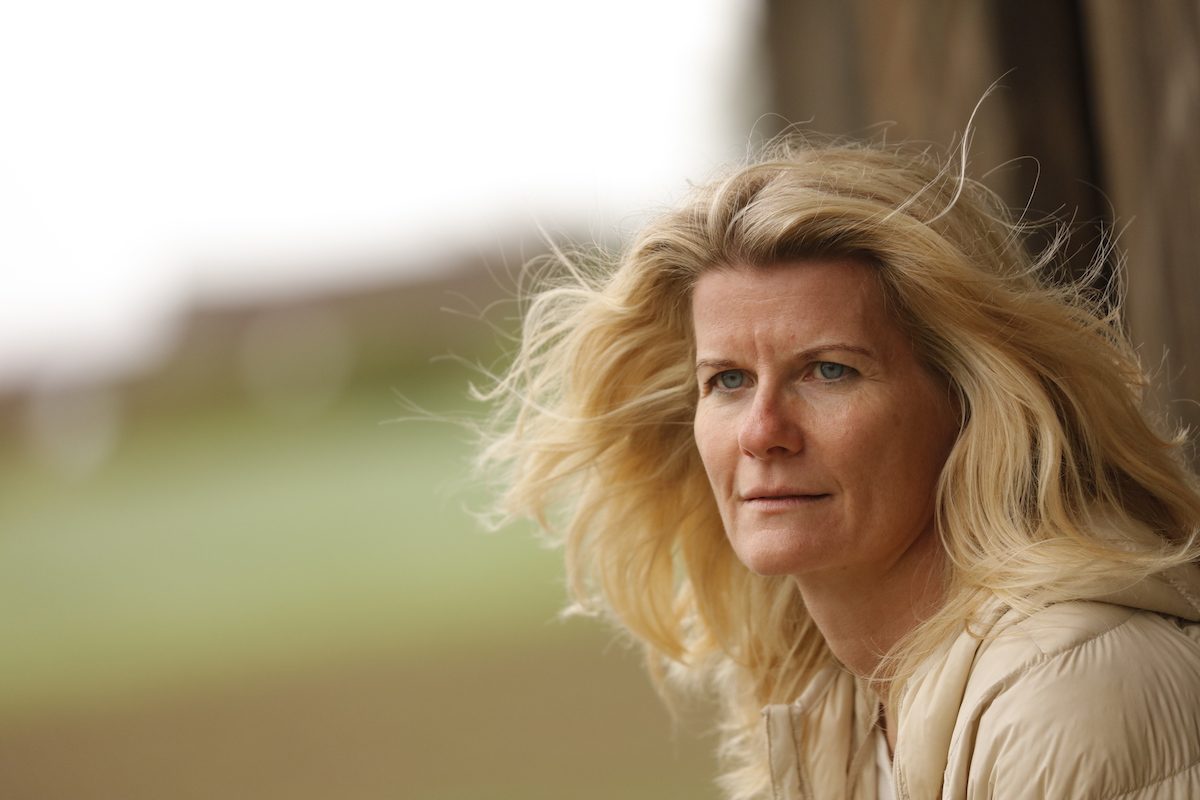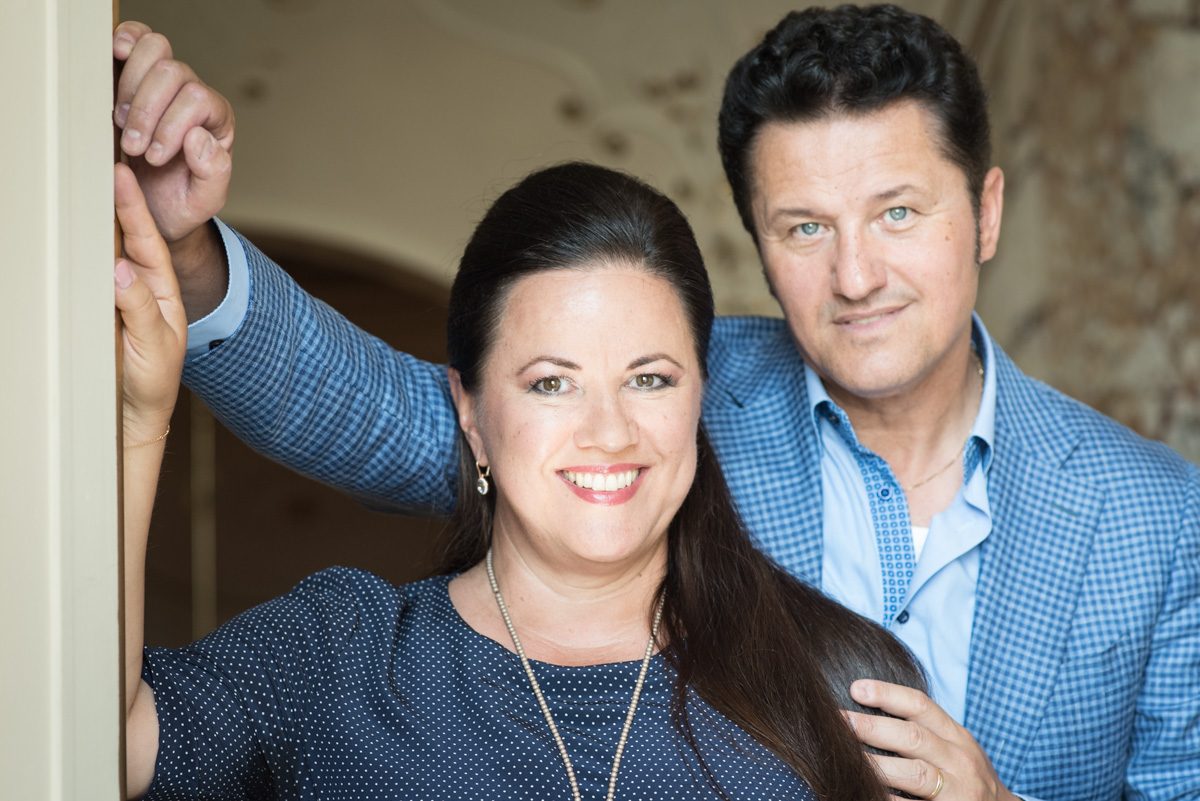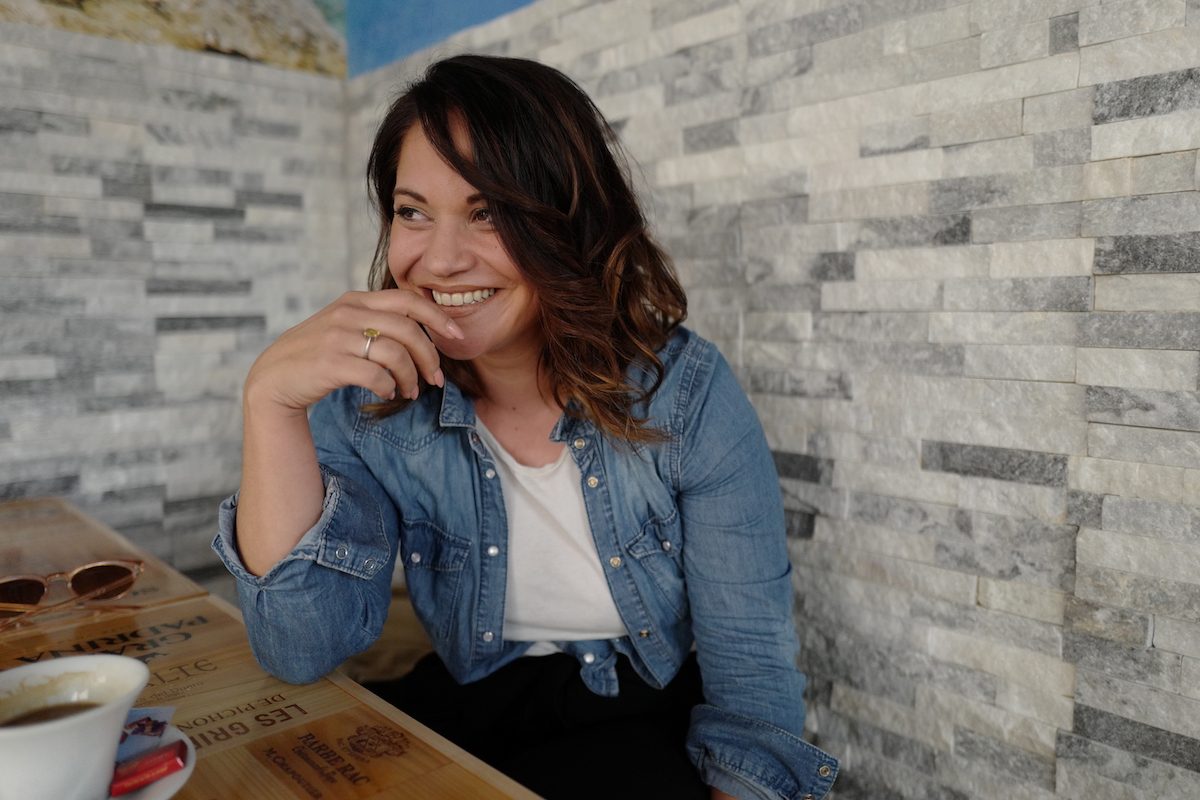
“My life is serious enough!” Silvia Meier-Jauch, ambassador Rheumaliga Schweiz
She’s a woman who catches the eye—attractive, intelligent, funny. And living proof that even when you’re ill, you don’t have to look it.
With her blogs and vlogs, Silvia Meier-Jauch laughs and curses her way through social media. The fact that the 36-year-old is more often to be seen giggling than serious might seem rather strange at first, but there’s a good reason for it. Making illnesses less intimidating has become something of a game for her—because, being personally affected, she says “my life is serious enough!”
And her light-hearted approach to everyday pain resonates with people. Whether in her capacity as ambassador for the Swiss League against Rheumatism or in her after-school club, where she conducts fun experiments with children from a wide range of cultures.
Talking about beautified truth, living the dream (or nightmare), and what it’s like for someone who suffers pain to be married to a pain researcher.
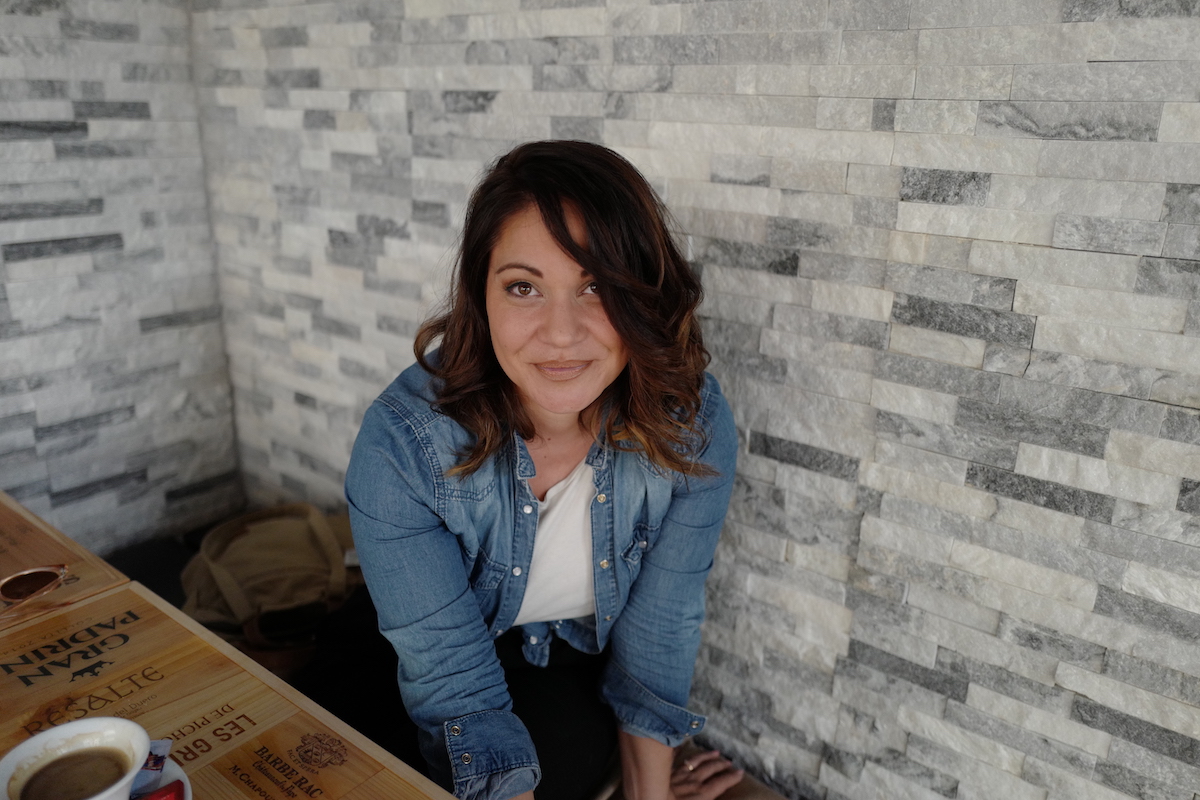 “I’ve always been a bit different!”
“I’ve always been a bit different!”
Anna Maier: You’ve told me how illness entered your life at exactly the same time as something else very wonderful—your newborn daughter. Did you realize at that moment or did it only become clear later on?
Silvia Meier-Jauch: Looking back today, I realize that I’ve actually always been ill.
What do you mean by that?
When I think back to my childhood, I was always in some sort of pain. I realized early on that I got tired faster and had more physical problems than others. But as a child you accept things as they are. When people tell you: “Stop acting like that!” or “It’s just in your head!” or “You’re just lazy!”—then that’s what you believe.
So you believed that you were overly sensitive?
Exactly. During puberty, I suddenly got a bad case of psoriasis. And I was so ashamed of it. Because once again people told me things like: “you need to take better care of yourself.” I just accepted that without questioning it.
Was school pretty stressful at the time?
That’s a touchy subject. I strongly believe that stressful, traumatic childhoods can promote illness. And, yes, I would say that I had a stressful childhood.
In what way?
My parents weren’t happy with each other and I felt their unhappiness all the time. I’ve also always been a bit different and never fit that classic image.
What was so different about you?
I was always a free spirit. I can get intensely passionate about something. I express myself artistically. I like to laugh and don’t take my life too seriously.
You’ve got a very funny side. That’s obvious from a look at your social media channels.
Absolutely. I like to be silly. Even small things make me smile. Others might not even notice certain things, but I’m already chuckling. That’s why people often think I don’t take anything seriously. But that’s not true. Above all, I take people very seriously, but I often just have a good time. And I’d much rather laugh my way through life.
Do you also have a pensive, melancholic side?
Not necessarily melancholic, but I’m very pensive. I’m aware that this isn’t obvious at first sight. When I’m out there, I’m bursting with energy, and I like to talk and chat. But at home, the opposite is the case. I think about things a lot.
Like what?
Schrödinger’s cat, for example. I could think about that for hours. Or a good book, or a good movie.
Life is always giving you opportunities to think deeply about things. But that doesn’t preclude pleasure. In my book, thinking deeply about something doesn’t necessary mean letting it weigh you down. Sometimes difficult situations are only difficult because that’s the way you want to look at them. Many people refuse to deal with these difficult issues at all. So if somebody else does, they often get labeled “melancholic”.
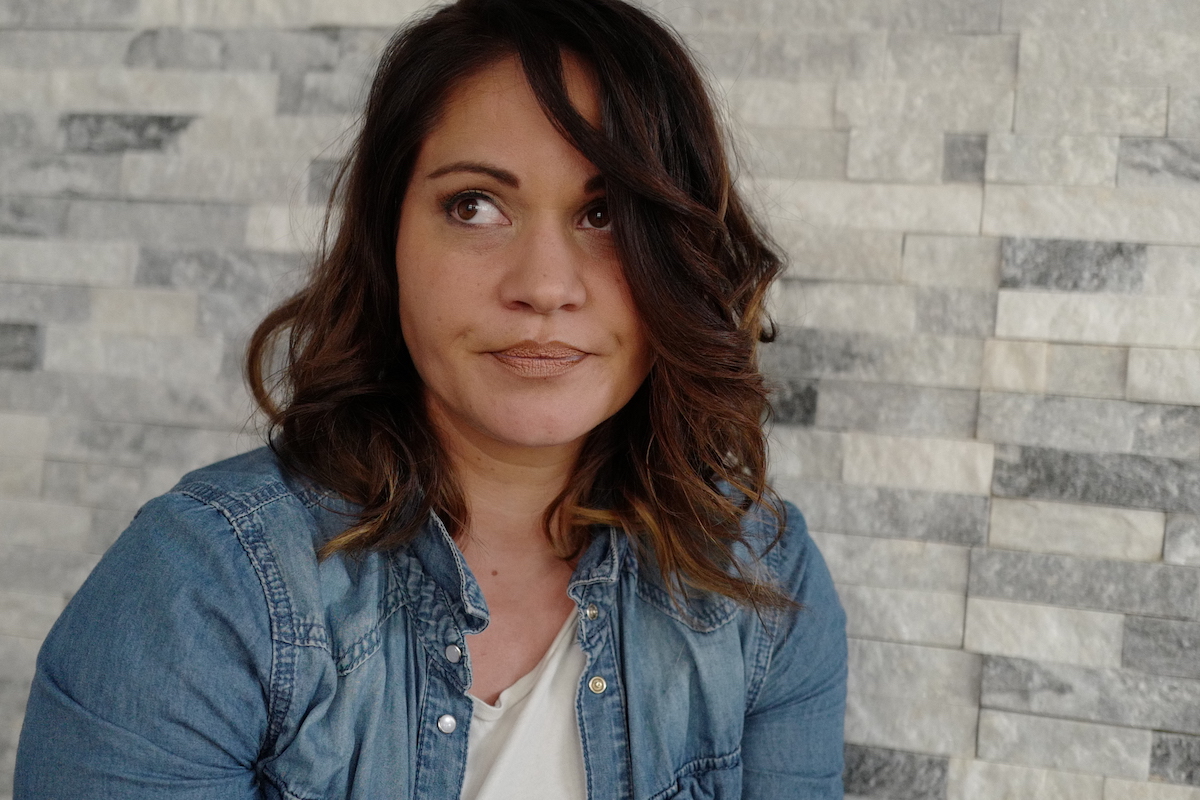 “It takes a lot of negative things to help me on my way towards a positive attitude.”
“It takes a lot of negative things to help me on my way towards a positive attitude.”
You’d actually have every reason to think: “Why me?” or “That’s not fair.” There are many people who can’t help but think this way.You seem to have a positive attitude to life despite your pain. Or is that misleading?
I definitely have my moments as well. Recently, for example, I had a horror night. My pain was practically driving me crazy. In moments like these, I feel like despairing. But then I always tell myself: all moments pass—the good and the bad. You just have to wait. Of course, I’m not exactly cheerful in such situations. Yet at the same time I say to myself: if something like this happens, don’t dwell on it. Because that doesn’t help.
And that’s what I keep telling my daughter too. When she gets annoyed about something, I say: “that’s life! Now it’s already happened, so make the best of it.” I love the phrase: When life gives you lemons, make lemonade.
And that’s also how I try to deal with my illness. But it took a lot for me to get to this point. It took a lot of negative external things to help me on my way towards a positive attitude.
What do you mean by that?
I am a hundred percent convinced that if I had been shown more sympathy, given more support, or met with a lot of understanding, I wouldn’t be where I am today. I don’t look sick enough, and I’m alive. That seems to bother people.
You’re surely more likely to hear “You look great” instead of “How are you?”. Does that annoy you or make you happy?
If it doesn’t have anything to do with my illness, then I think that’s cool. But if I hear it in connection with the disease, then it annoys me. This is something I also like to discuss on my blogs and vlogs. I often show myself without make-up there. So people can see the reality too.
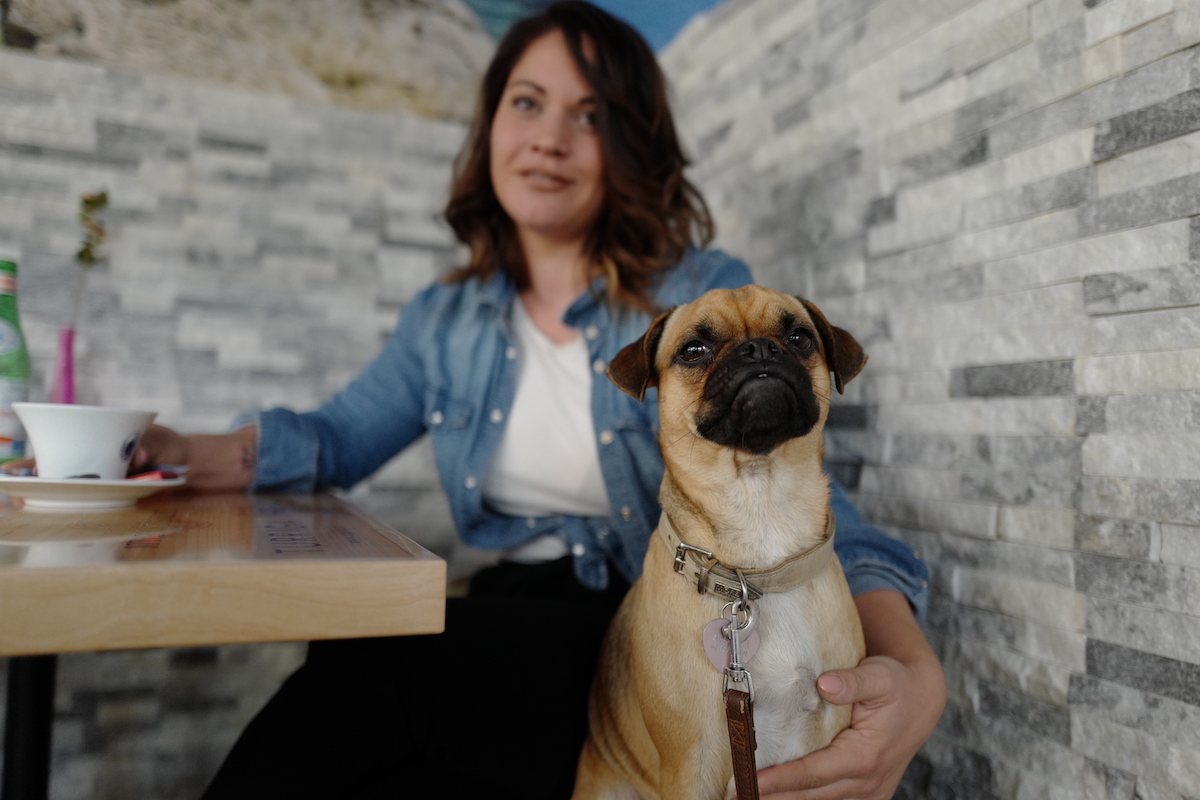 “The pain is there, even if you can’t see it.”
“The pain is there, even if you can’t see it.”
Do you think that people sometimes think you’re just faking it because you look so good? Because you don’t look sick even if you feel sick?
Yes, that happens to me time and time again. Since I began speaking publicly about my illnesses, I have received many apologies.
From whom?
From former acquaintances who admit that they had never really taken me seriously but now—thanks to my educational work—have a better understanding of everything.
When did you start talking about your illnesses? I assume, it takes a lot of effort to talk so openly about the ugly side of life.
It went on for ages. When I got seriously ill… It hit me like a bombshell.
After giving birth?
After giving birth, I was in constant pain for about three years. I lived with disabilities. I couldn’t walk easily, for example, and nor could I use my arms properly. I couldn’t use my hands anymore, either. Then suddenly I lost the use of my feet. And still I kept on trying to engage in competitive sports.
So what’s your actual diagnosis?
Psoriatic arthritis. That’s what they say. But for me, it’s just a diagnosis. Who knows what people will think about it in twenty or thirty years? Like with MRI (magnetic resonance imaging). They do lots of MRIs nowadays, even though research indicates that they’re not actually all that helpful. Because the pain is there, even if you can’t see it.
Did you have a normal pregnancy?
No, it was awful. That was also why I needed a C-section, because one of my legs stopped working during the pregnancy.
One leg “stopped working?”
Yes. They assumed something was pressing on a nerve. It was awful. I really suffered. After the birth, I got psoriasis. I had problems with my hands and knees the whole time. I frequently felt tired and exhausted. In retrospect, I have to say that a good family doctor would probably have realized sooner what’s going on. Instead, they gave me antidepressants. I was a single mom. They thought I was just stressed out.
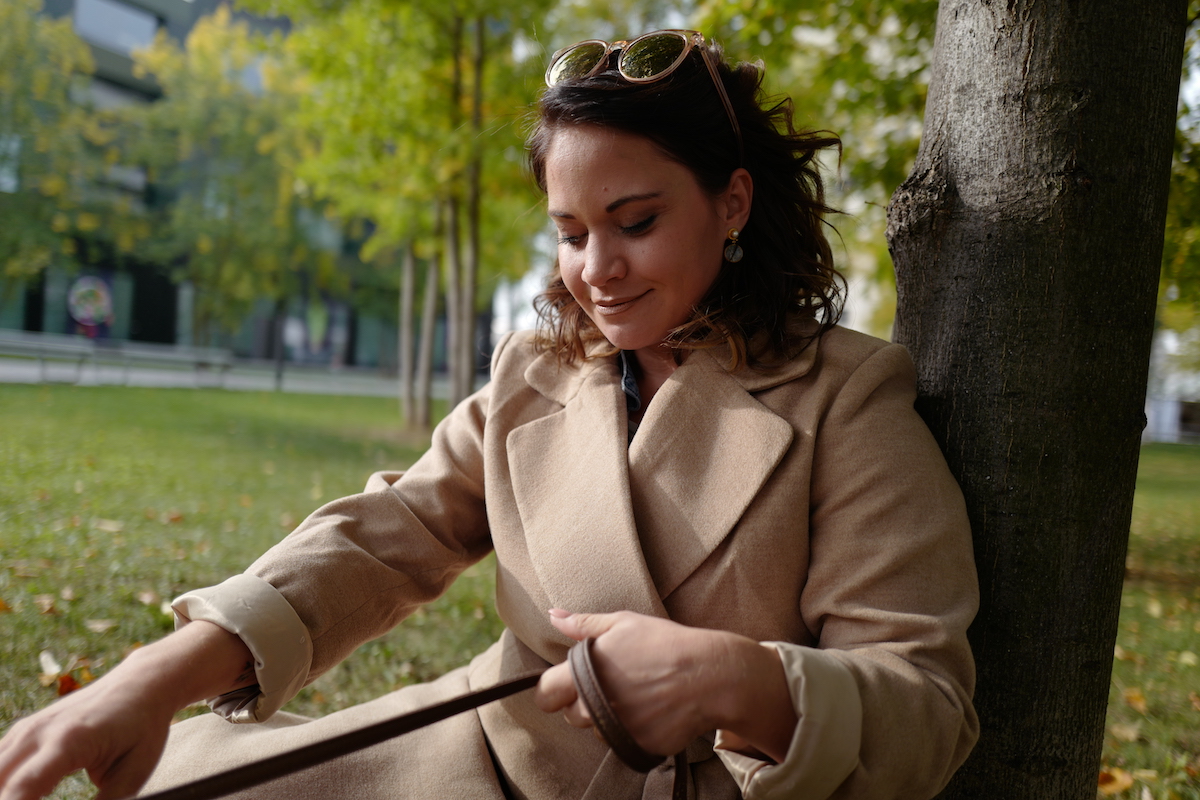 “Living with disabilities, you end up being stigmatized anyway.”
“Living with disabilities, you end up being stigmatized anyway.”
You must have felt pretty helpless in that moment.
Once you’ve been tagged with that “psycho” label, it’s really hard to get rid of it again. It’s fine to take psychological factors into account, but why can’t people view it holistically? I don’t understand why everything else has to be ruled out completely first.
Isn’t it also about taking you seriously as a patient? Patients often know themselves very well and can tell you whether something more might be going on, beyond a simple mental imbalance.
Yes, I do believe that it has a lot to do with how seriously a doctor takes the patient. Or if he’s just happy if there’s a diagnosis of some sort.
Take the example of a refugee after a traumatic journey who starts to develop pain: I’m pretty sure that it’ll be near impossible for him to get a correct diagnosis; instead, everything will instantly be blamed on trauma. It’s the same when you go see a doctor and have a bad history. I think that’s a shame.
Living with disabilities, you end up being stigmatized anyway. When people then also tag you with this label, and tell you it’s all in your mind, it affects everyone— your friends and family, your employer. They’re all glad to have a “label” for it. People want something tangible.
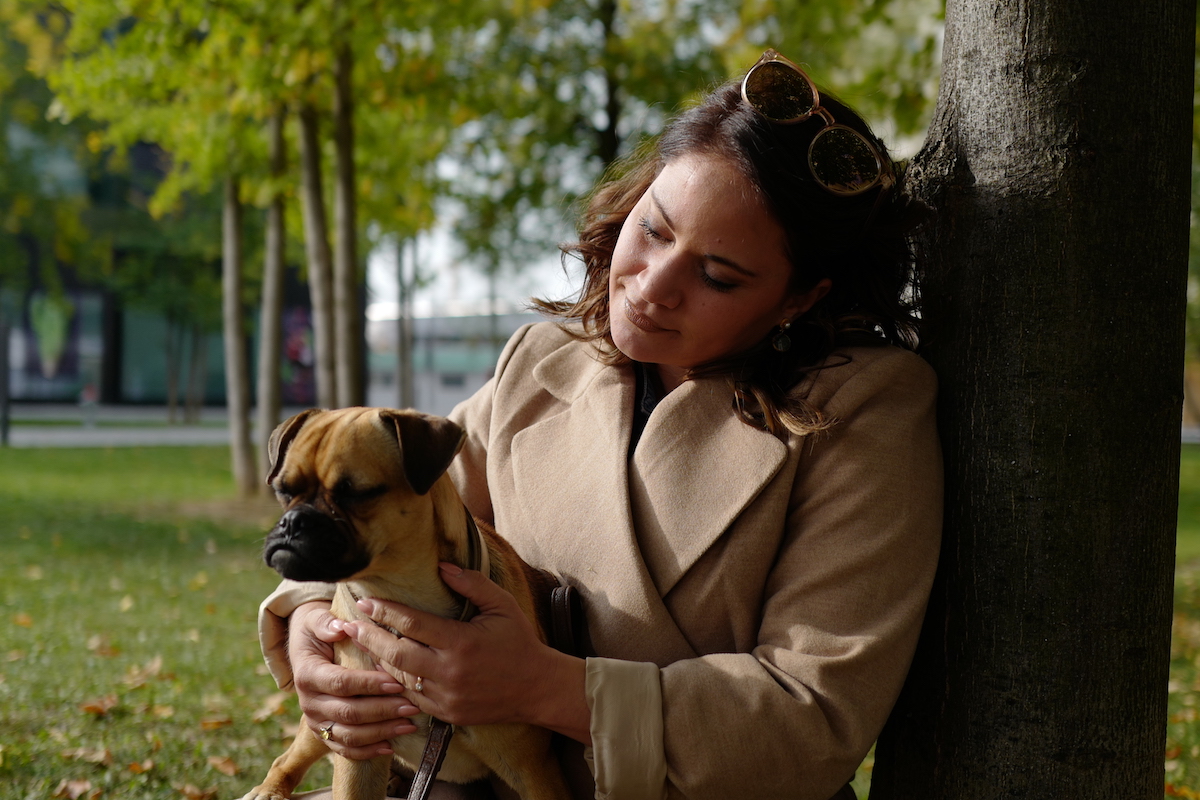 “So you have to ‘act’ ill if you want to be taken seriously?”
“So you have to ‘act’ ill if you want to be taken seriously?”
Many people seem to have real problems handling uncertainty. And it’s the same when something goes on and on and on: “she’s been complaining for years, and there’s nothing wrong with her!” Can you sympathize with that?
It would be nice if people could start to think differently. Everyone’s bound to have a neighbor with hip pain. Then she goes and does an MRI, but nothing comes of it. So there’s nothing wrong with her. Yet she’s still in pain! Just because you can’t find the cause doesn’t mean it’s nothing.
Research realized this a long time ago. It’s no longer just about diagnoses, but the pain that’s there is accepted. If we worked on making the average person understand that, prejudices would also decrease somewhat.
It may sound brutal, but isn’t it just the case that many healthy people simply don’t really care if others are sick?
Probably. Unless you know someone who’s affected. Or if it affects you yourself.
And that’s something I find very interesting: if you look at the statistics, 1 in 5 people in Europe are currently suffering from a chronic pain disorder. So theoretically, we should all know someone who is affected or even be affected ourselves.
In the light of this, I find the often strong judgments all the more surprising! People like to say: “she’s just not doing what she should” or “she’s got the wrong attitude”. That makes me angry. Nobody knows the severe pain other people might need to live with.
For example, I enjoy the occasional drink at club meetings, and sometimes I smoke e-cigarettes, too. Of course, the impact of this cigarette isn’t great. But enjoying something and letting go is perhaps three times as good for me. How can anyone judge that for me?
But as soon as I feel worse, I often hear things like: “then why did you smoke yesterday?” The answer is simple: because I’m living my life.
At the beginning of my illness, there were times when I didn’t make myself look pretty before I went outside. I thought, if I wear make-up, they won’t believe me.
I even came to the conclusion—which, by the way, was the topic of my first vlog—that you have to act sick from time to time to be taken seriously as an ill person. I really can’t stand that. I’m not having it any longer.
And how do people react to your “beautified truth?”
After my first interview, I received a lot of e-mails from people wondering how I can look so good even though I’m sick. And how I can produce so many blogs and vlogs, although I’m not feeling well. I picked up on that immediately.
If there’s one thing I love in this world, it’s getting glammed up when I feel awful. For me it is a form of modern meditation. I stand in front of the mirror and take time for myself.
But it also makes it much harder for those close to you to recognize your pain.
That’s why I sometimes do vlogs where I film myself during an attack. I get an amazing number of responses to these. The best ones come from people who are in good health themselves but say my videos have helped them to understand how people feel when they live with constant pain.
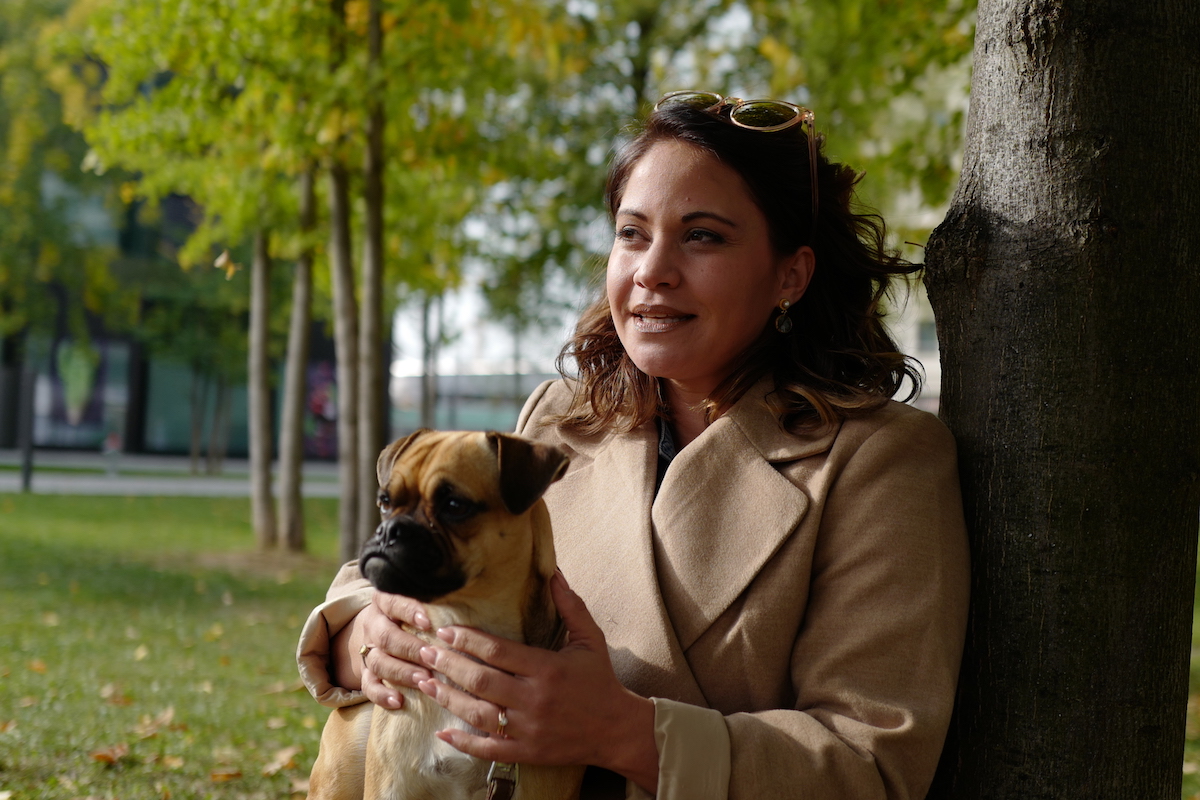 “What’s wrong with you?”
“What’s wrong with you?”
You said earlier that your illness “hit you like a bombshell” two or three years after the birth of your daughter. What exactly happened?
It was the worst and dumbest story you can imagine. I had a really cool job. I was working as an assistant in a surgery for behavioral neurology. I loved my job.
I had a great boss, a lot of freedom, I earned good money, I was a tough career woman and single mother. I was the kind of independent woman people liked.
Although I was often in pain, I always delivered. At that time, I was almost doing high-performance sport again; I had my six-pack and lived my life.
Then I met and married the man who is now my husband. At the wedding, I already thought: “weird, why can’t I stand up in my heels for more than an hour?” I remember that I took flat shoes to the wedding and wore my comfiest sneakers on my honeymoon.
Then fall came. And things started going downhill. It all began with extreme fatigue. I was promptly told it was depression. After all, it was all a bit much at the time. I said: “no, I’m really happy! I’m not depressed!”
Then I started experiencing increasingly severe pain. I suddenly had problems with my vision. It felt like I saw everything through a white veil.
What happened there? Do you know that today?
Apparently, rheumatic diseases can lead to vision problems. And I also experienced terrible bowel issues. Diarrhea. From that point on I was no longer taken seriously.
The doctor said I had a stage 3 bowel prolapse. “Most people don’t get something like that until they’re 90. What’s wrong with you?” the doctor asked me—almost accusingly! They should have operated immediately, but they couldn’t, because my general state of health wasn’t good enough. The anesthetist told me to get my immune system checked out.
In the end, they discovered there was something wrong with my optic nerve. “Why? Is there something in the family? And where do the joint pains come from?” But the bowel and eye problems were enough to get me labeled a hypochondriac.
Bowel, eyes, joint. It was obvious that there was something wrong with me. But neither my husband nor my parents could handle it. I felt pretty alone. Because I was the only one who believed that I was seriously ill.
Because of the pain, I also developed obsessive thoughts; I wanted to have my legs amputated. I only cared about getting rid of the pain.
I stayed on the ball and wouldn’t allow them to write me off, and over time—after lots of tentative diagnoses—the real diagnosis became clearer. Unfortunately, however, there is no black-and-white diagnosis for rheumatism.
There are types of rheumatism that can be found in the blood, and others that can’t. But ultimately three doctors all said the same thing: psoriatic arthritis. I was treated with immunosuppressants and low-dose chemotherapy.
And I gave up my job, of course. Sadly, I couldn’t leave on good terms.
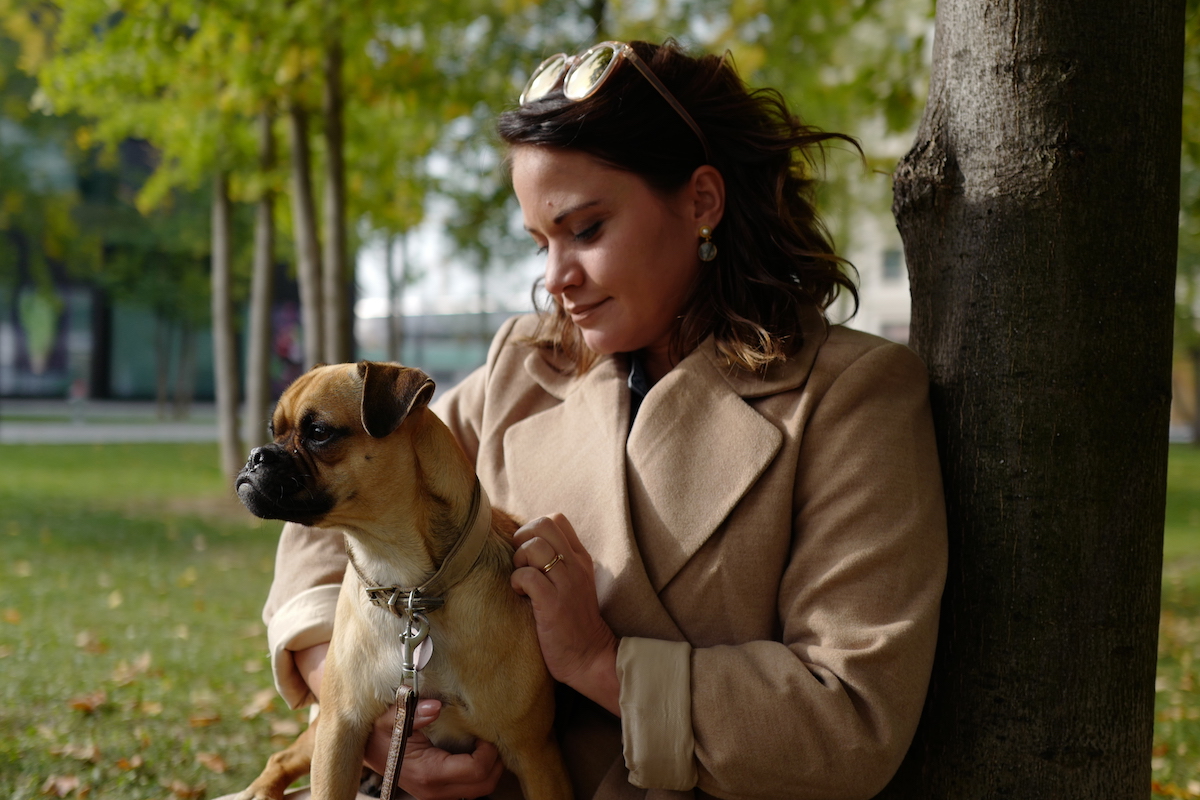 “Suddenly they all disappeared.”
“Suddenly they all disappeared.”
Why not?
Sometimes it still breaks my heart. It was going so well. Right up until the moment when my body began to rebel.
From one day to the next I was unable to work because the illness was so severe. No one believed me.
Instead, I was told that I was newly wed and things probably weren’t going so well, so I was stressed. That really hurt. Then I eventually resigned and was told that I was ungrateful.
And by the way: of course you’re extremely stressed when your body gets sick.
Did the same thing happen with friends and family? Did friends look at you skeptically because there was something up with you all of a sudden?
Youth and illness are a bad match, a philosopher once said. Nothing could be more tragic. Particularly when you have no idea whether it will ever get better. That’s life-changing.
I found this situation incredibly painful. And that I couldn’t really be there for my daughter. She was on her iPad a lot during this time.
How did you organize childcare for her?
She went to a nursery. And it often happened that I just fell asleep next to my daughter. She was still at the age when she would happily sit next to me and play. If she suddenly started screaming, I’d wake up.
So you didn’t work at all anymore?
No, I couldn’t do anything anymore.
You were catapulted out of your social life.
Yes, suddenly they all disappeared. There you are, newly wed, and you can see people looking at your husband and thinking, “poor guy, he made a bad choice there.”
I’m not kidding: my husband is a pain researcher. People think that’s an advantage. But it’s not. After all, theory and practice are worlds apart. But nobody understands that. I sensed that friends and family felt sorry for us.
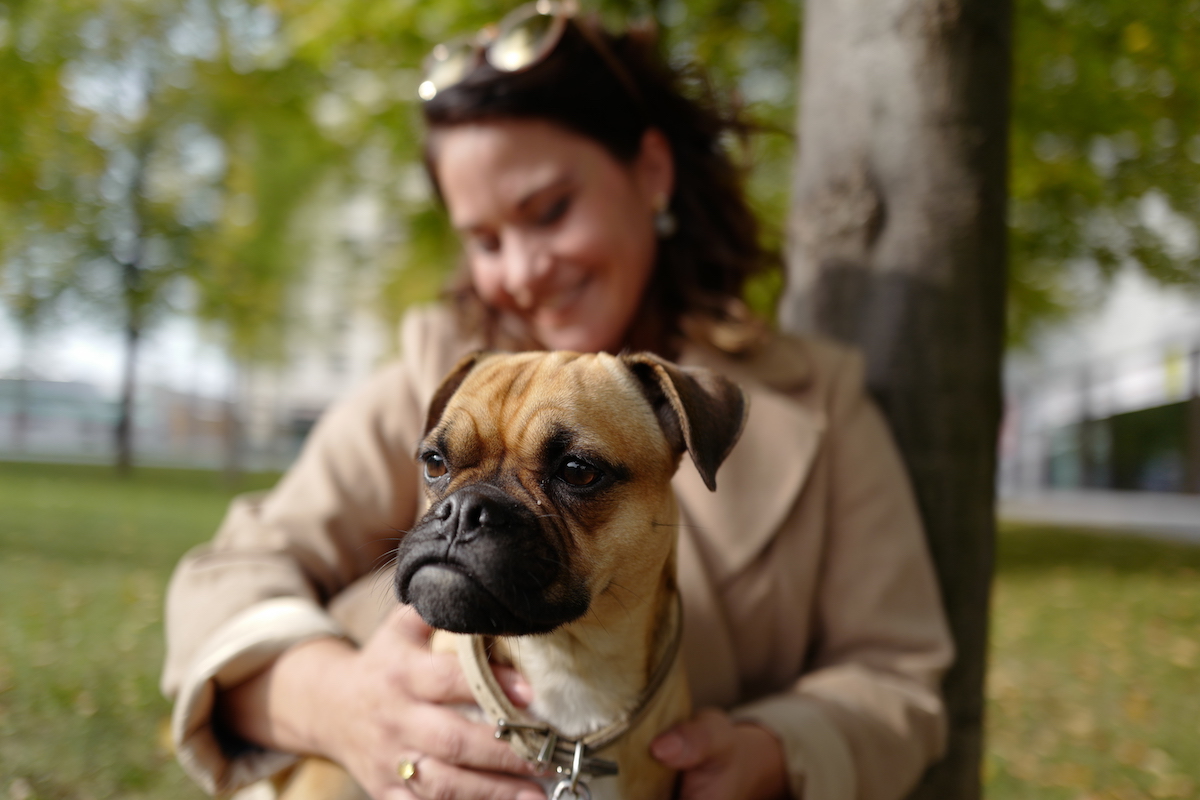 “Lots of people were shocked at how aggressively I talked about illness.”
“Lots of people were shocked at how aggressively I talked about illness.”
How did you respond?
I accepted it and gave up. And then eventually the moment came when I realized I had to carry the burden alone—and that I was strong enough to do it.
At that point, I began to distance myself from people who weren’t good for me. I thought: either you help share the burden, or you leave me in peace! And then I began to wonder why I wasn’t proud of myself. Because at the end of the day, I was almost as productive as everyone else—and sometimes even more so. I have to adapt lots of things to my state of health, of course, but I reckon I can be proud of myself.
This thought began to take root, and then I started to get a bit bold.
In what way?
If someone made a stupid remark, I didn’t retreat in shame. Instead, I’d say “really? Can you explain that, please?” I got provocative—in a humorous, cheeky way.
Ultimately, what opened my eyes was an interview with the TV presenter Robin Rehmann, who suffers from ulcerative colitis. He talked about bowel movements and things I’d never heard people talk about like that before.
I thought to myself: “what’s he doing!?” But then I sat there and suddenly realized how stupid I was being. Because I realized what he was doing was a huge gift for so many people out there!
That was when I decided I really wanted an organization of my own. I’d talked about it before, lots of times, but then I’d always abandoned the idea because I thought hardly anybody would be interested.
I think lots of people were initially quite shocked with how aggressively I suddenly tackled the issue of illness. Offensively and very cheekily and directly.
I received some angry e-mails. And my husband was really embarrassed after my first vlog. I think he had a trauma (laughs).
And then suddenly I started receiving the first positive responses. And nowadays I get tons of e-mails every day, it’s amazing. One person wrote: “Someone made a stupid comment to me today. Before I would just have gone home and cried. But you know what I said? ‘Hey, I do enough!’ And do you know why I said that? Because I saw your video!” I love that sort of thing.
As a pain researcher, your husband must surely have found it very tough that you of all people, as his wife, suffered constant pain. How did he handle it?
Naturally, he took a distanced and professional approach. The researcher in him said, “How sure are you that your pain is only connected with the diagnosis?” So I felt he wasn’t taking me seriously. He was! He was just looking at it from a different angle.
I think our approaches have blended increasingly in the past year. We’ve found common ground, and we understand both sides better. I’ve learned to understand his perspective, he’s learned to understand mine.
And he’s no longer as embarrassed about how aggressive I’ve become. Researchers are generally rather reticent. A cliché, perhaps, but it’s true. He didn’t find it easy when his wife started talking publicly about unpopular issues. I curse in my videos, and I’m cheeky.
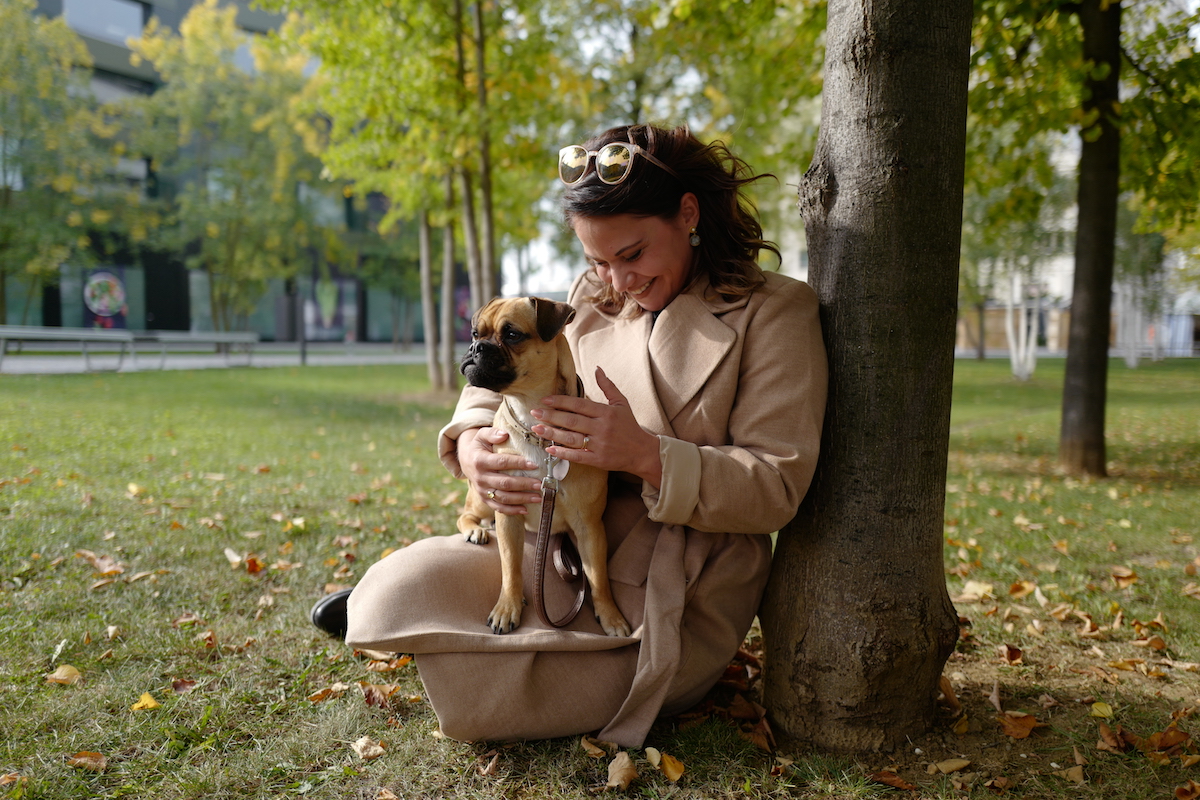 “I’ve got enough serious stuff in my life!”
“I’ve got enough serious stuff in my life!”
Let me guess: you never cared what other people think about it?
No, I’ve never sold myself in my life. Perhaps that’s my greatest weakness. Politically, too. I just can’t pretend to be someone I’m not.
But this seems to resonate with people. Last April you were elected onto your local council in Schlieren.
The conservatives presumably weren’t very happy about that. I notice that a lot of people have trouble with my approach. But I’ve noticed that others suddenly find it cool the more famous I get.
Actually, it doesn’t matter how hard you try— there will always be some people who don’t like you. Which is why I decided to do it my way, right from the start. Some people hate me, but others love me.
And you really don’t care?
Truly? Yes. So many people have warned me about my vlogs, have said I’ve gone mad and this time I’ll “go under.” So many people tell me I’m going to ruin my life.
Friends and family, or total strangers?
Both. And then sometimes I remember that I’m only one of billions of people on this planet. What do I matter?!
I once read a study about what people think about most when they’re dying. They never think about the things they did; they think about the things they didn’t do.
So I do what’s right for me so long as it doesn’t hurt anyone, and I have fun. I’ve got enough serious stuff in my life!
From an outside perspective, you do an incredible amount. You also run an after-school club for children. What makes you so determined to be active?
I was confined to my bed through illness for a relatively long time. You realize very quickly how precious life is, and that we need to make the most of our lives.
For me, making the most of life means stepping outside of my comfort zone, at least once a day. Looking back, some of the best moments of my life have been moments I should never have experienced—or never wanted to.
Take this example: when I was 21, I spent all my money on a trip to the Maldives. I loved it so much that I flew back there six months later. Then again and again, as soon as I’d saved up enough money. Other people thought I was mad, but it was an amazing time in my life. Because I did something, I risked something.
Or the project I run with the kids. People often talk about how few children here in Schlieren qualify for preparatory high school. But I’ve always thought it’s far more important to look at the way we approach children.
Every child can achieve academic success. Where there is love, there’s a will and a way.
So it didn’t take long before I founded the after-school club. It was so cool to see students no one would ever have expected turn into little gems during the course and became really passionate about the experiments. And now, if they see me on the street, they give me a hug.
The third effect, which is very healing for me, is that I don’t have time to grapple with my illness. It’s a form of escape. And if anyone says I ought to be grappling with it, then all I can say in reply is— I do that every single night. As soon as it gets dark.
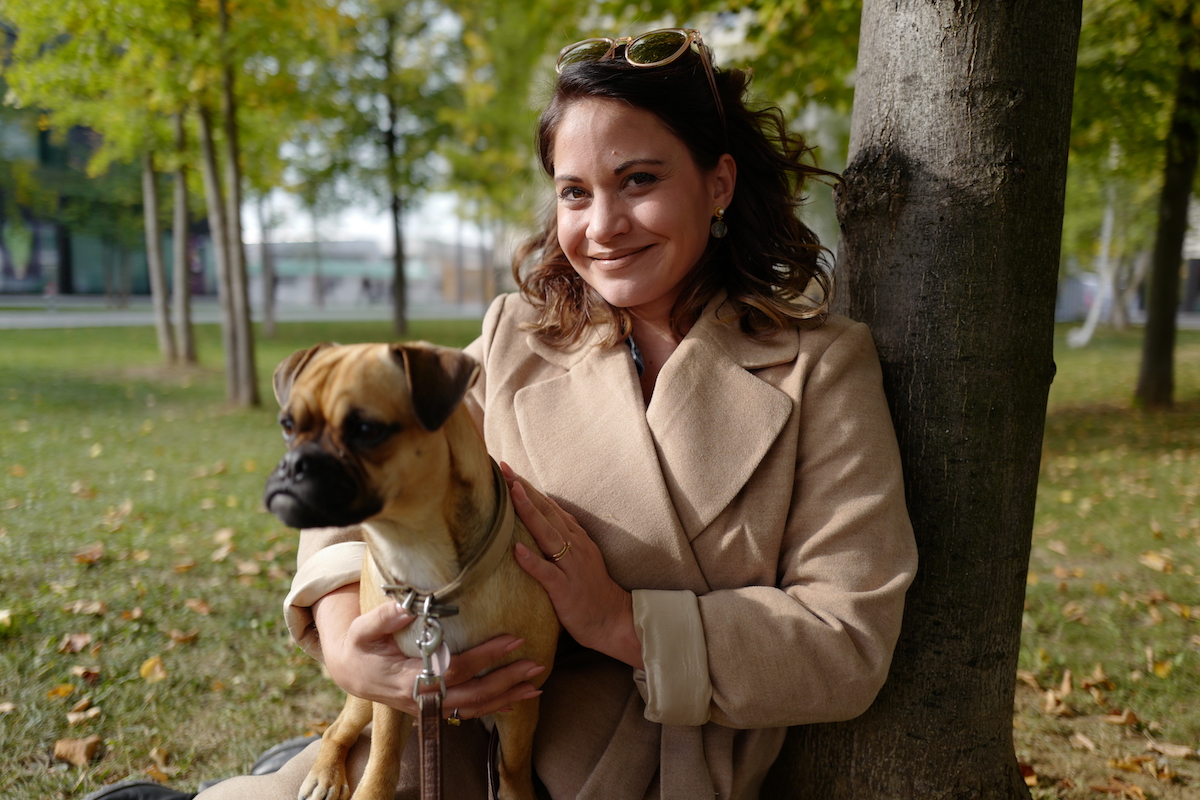 “I wanted to feel alive again.”
“I wanted to feel alive again.”
Is there anything you can’t do that you would like to be able to do?
I used to be an absolute beast. I could do all kinds of things with body—even when I was in pain. But now, if I think about all the things I wanted to achieve in life … traveling, climbing mountains, deep sea diving … I realize there are certain limits I simply can’t overcome.
I constantly need to watch out in case I have a bout, and I need to take a preventative approach. I have to be very disciplined. I had to cancel a different appointment to meet with you today. My entire life is governed by scheduling and prioritizing.
I don’t want more than other people, but I have to do without a great deal. That often saddens me.
What could you not do without?
Two years ago, during the longest attack of my illness, I took a diving exam in Lake Zurich. It took an immense amount of effort. I could hardly see anything and it was icy cold—which is bad for me at the best of times—but I just wanted to feel alive again. I was testing my physical and mental limits, but I went through with it. The diving course was a new start for me.
What do you mean, a new start?
That I can still give it all I’ve got, in my own sweet way.Diving and I, we’re friends. I was a natural, right from day one. It’s the best thing I’ve ever experienced in my life. My thing.
Now I’m looking for diving schools that will go diving with people with disabilities. If it does me good, maybe it’ll do other people good, too.
www.rheumaliga.ch
www.instagram.com/rheumaliga_ch
Text and images: Anna Maier
Newsletter
Subscribe to our newsletter and you'll get notified every time a new article is online.

